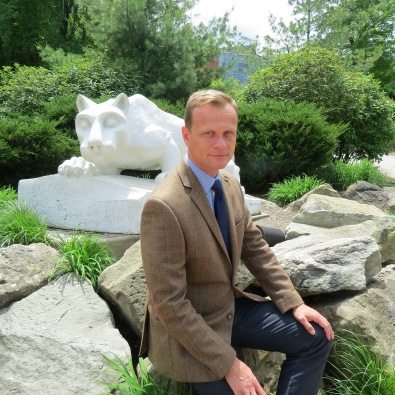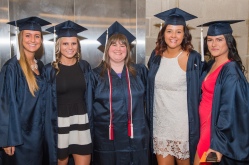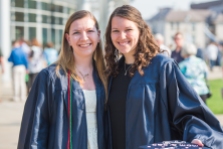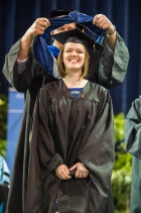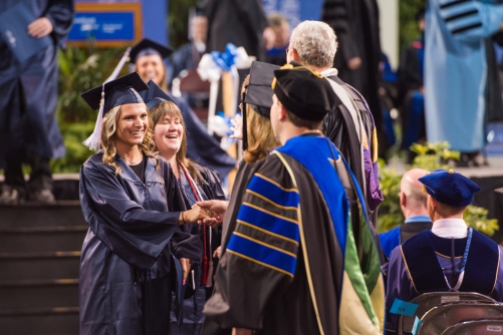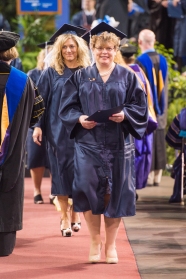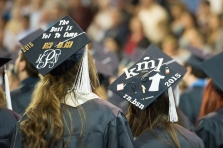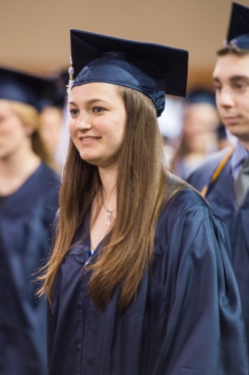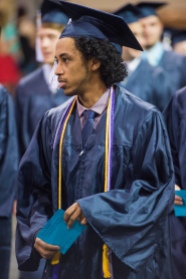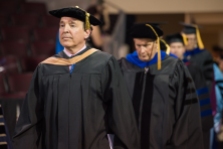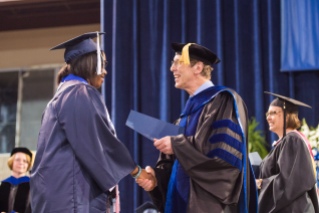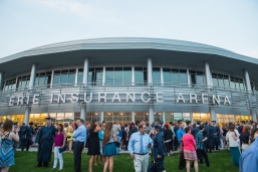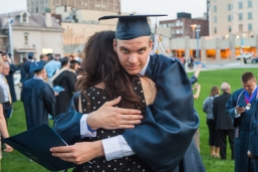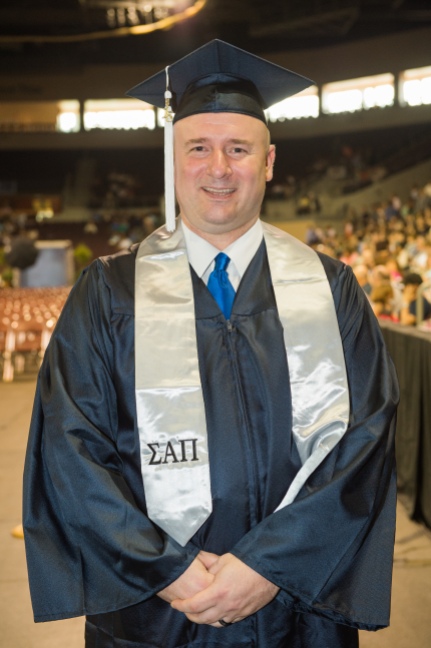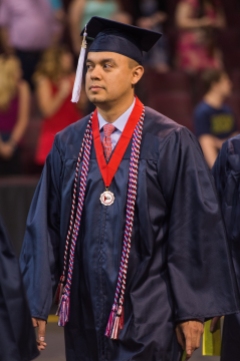By Heather Cass
Publications & Design Coordinator, Penn State Behrend
Dr. Bernd Hacker
Penn State Behrend welcomes the opportunity to host foreign scholars who enrich our community’s intellectual and research endeavors, international connections, and global perspectives.
Dr. Bernd Hacker, a professor from the University of Applied Sciences in Rosenheim, Germany, a partner school of Penn State Behrend, has been a visiting scholar in the Black School of Business since January.
With Hacker’s experience at Behrend drawing to a close in August, we sat down to talk with him about his time at the college, how students in Germany and the United States compare, and the 5-year-old quadruplets (two sets of identical twins!) he and his wife are raising.
How did you end up at Penn State Behrend?
In February of 2014, Penn State Behrend and the University of Applied Sciences in Rosenheim signed a memorandum of understanding, agreeing to collaborate in various areas including student and faculty exchange programs and joint research projects and educational programs. I was the first to enroll in the faculty exchange program.
What courses did you teach?
In the spring semester, I taught ACCTG 305: Financial Statements and Management Decisions and I’m currently teaching a summer course, ACCTG 211: Financial and Managerial Accounting.
Are accounting principles/lessons the same in the United States as Germany?
Yes, accounting principles don’t change. However, the teaching structure and system here are different from what I know.
How so?
In Germany, we don’t have midterms, quizzes, or graded homework assignments. We have a full semester of teaching followed by one big exam or project at the end of the class. American students are tested and graded much more.
So which system do you think is best?
I think a combination of both systems might be ideal. There is value to the system as it is here for students in their first year or two of college who might need more guidance and feedback. As students move toward graduation, though, I think it’s important to transition them to a more self-directed system in which they have to come up with a plan for self-assessment, manage their time, and succeed without a lot of feedback or guidance along the way. I plan to take some of what I learned here about exams, testing, and quizzes to Rosenheim and try it in some of my classes with younger students.
In what ways is Behrend like your university?
They are similar in size with Rosenheim having about 5,500 students (Behrend has about 4,350 students). We have similar schools within our university and, like Behrend, we have very strong business, engineering, and plastics programs.
What is the biggest different between the universities?
We don’t charge tuition. In Germany, there are some private universities that charge tuition, but not many.
So everyone in Germany can go to college for free?
Yes, and no. It’s free, but not everyone can go. Admission is strictly merit based. There are only a certain amount of slots to fill in the programs at the universities and if you’re not good enough to earn a spot, you don’t get in. Some programs are more competitive than others, but in general, you have to have very good grades to go to university.
In Germany, students are separated at about age 10 or 11 and put on different tracks. Gymnasium is for academically-inclined students headed for college. Realschule is a middle level education for average or higher white-collar jobs. Hauptschule is for trades and blue-color jobs. It is possible to switch tracks, but not common. More about the German School system here.
How do students in Germany and the United States compare?
They are very much alike. They care about what they learn. They are concerned about their grades. They like to have fun on the weekends. I learned that students are not that different around the world.
Did anything surprise you?
I couldn’t buy a car without a United States driver’s license, so we rented one. Also, the winter was much colder and snowier here than in Germany. This children enjoyed the snow though.
You and your wife have quadruplets?
Yes, they are going to be six years old soon. Two boys and two girls, two sets of identical twins.
That must’ve been shocking news?
Yes. The doctor kept finding more in there whenever we went back. (Laughs)
Did your family travel to the U.S. with you?
Yes. My wife is a lawyer and she took a sabbatical to bring the children and come with me. She’s really enjoyed the extra time with the children. They love the beaches at Presque Isle. They also attended preschool from January to May, which was a great international experience for them.
Have you always wanted to be a professor?
Yes. I taught while earning my Ph.D. and I enjoyed it. I worked in the banking industry for five years and at Seimens (the largest engineering company in Europe) prior to teaching though. In Germany, in the applied sciences college, professors are required to have five years of industry experience before becoming a professor.
How have students benefitted from the agreement between the universities so far?
Right from the start, we were able to arrange internships for Behrend students in Germany. The first intern went to Germany in May of 2014. This summer, three students are interning in Munich, Berlin, and Rosenheim. It’s a great opportunity for Behrend students to gain international experiences in multinational companies.
Have there been any student exchanges yet?
We’re currently working together on making it viable. There are several departments in Rosenheim that match Behrend’s four schools. We, too, have a School of Business and a School of Engineering. We also have a School of Business and Engineering, so I see a lot of opportunities for Behrend students to go to Germany and our students to attend Behrend. I am confident the partnership will benefit both schools, and I’m looking forward to greeting the first Behrend students at the University of Applied Sciences in Rosenheim.
Any advice for students interested in studying in Germany? Do they need to learn German?
No, you can definitely get along speaking English in Germany. Most Germans can speak, or at least understand, English. I would advise students to plan as early as possible if they want to study abroad. There are financial considerations (travel and accommodations). They should also keep some of their electives open. Students can earn 12 to 15 credits while in Germany, but they may need to be credits from their available electives.
Where can students get more information about the German exchange program?
Contact Ruth Pflueger, director of the Learning Resource Center, at (814) 898-6418 or rcp1@psu.edu.

